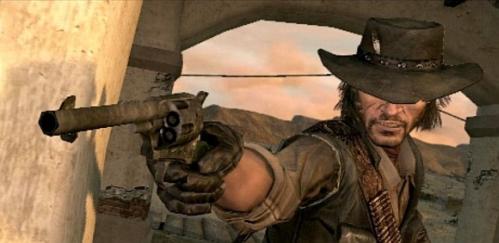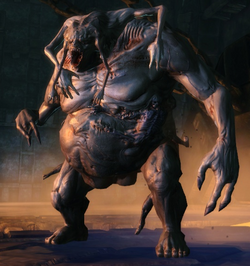It's easy to look at Red Dead Redemption and expect another sprawling epic from the excellent development team over at Rockstar. Red Dead Redemption is a game which perfectly embodies its setting while using that tried-and-true gameplay structure pioneered by Rockstar's 2008 masterpiece, Grand Theft Auto IV. However, it's quite difficult to realize that Red Dead Redemption is a far cry from Rockstar's magnum opus - since it is, in fact, one of their weakest games in a long time. Just looking at Red Dead Redemption, it's hard not to be impressed by its wonderful sense of place, but once you get beyond that, you'll realize you're playing yet another thoroughly unremarkable sandbox game.
Red Dead Redemption is set in 1911, the brink of the Wild West's end. Players step into the shoes of reformed outlaw John Marston as he tracks down his former gang members on orders from some mysterious government men. Things aren't that simple, of course, and soon enough Marston will find himself entangled in many different conflicts north and south of the border.
The story in Red Dead is simultaneously one of its strongest, and weakest points. To start with the positive, John Marston is one of the greatest protagonists in video game history. As a reformed outlaw trying to settle down in a society that's quickly becoming civilized, he's a man without any real place in the world, and his flaws and personal struggles really come to the surface throughout the story. And for the first few missions in the story you'll encounter a couple other great characters, but the rest of the West's denizens swiftly move into the realm of lame caricatures: a sleazy seller of "miracle" elixirs, a retired gunslinger, and a drunk Irishman. Thankfully, John Marston's story is the focal point of Red Dead Redemption, and its key moments are pulled of wonderfully. Unfortunately, you'll be so tired of it's secondary characters that getting to the good parts feels like a grind more than anything else.
As a period-piece, and character study, Red Dead Redemption goes above-and-beyond most games (despite some inconsistencies involving its setting), but the game loses a lot of its impact simply because not enough time is spent on plot points, and characters that truly matter.

Red Dead Redemption uses Grand Theft Auto IV's basic framework which covers everything from the gunplay to the mission structure. As such, it plays a lot like Grand Theft Auto IV, however, it includes many subtle differences that better suit its time period. Probably one of the most obvious of these changes is how you get around. Instead of hot-wiring sports cars, you can tame (or buy) a horse to call your own which you can keep throughout the game's entirety. Getting around on horseback takes some getting used to, and even when you have it down, it's never really that fun simply because it's a little too nuanced for the sake of realism. Your steed is constantly losing stamina, thus its speed is always varying, creating a frustrating struggle between the player's desire to simply gallop through the country-side, and the limitations of their horse.
The gunplay is also largely like what you'd find in Grand Theft Auto IV, however numerous improvements have been made. Health recharges, more than one of each type of gun can be carried, and there are some brutal close range kills in case enemies get a little to close for comfort. Perhaps the most significant piece of Red Dead Redemptions gunplay is Dead Eye. If Dead Eye is deployed, everything slows down for a brief time, letting you set up some insane kills that can decimate whoever stands in your path.
At the end of the day, Red Dead Redemption is a sandbox game before anything else, and RDR certainly keeps up the genre's various conventions, all the while brilliantly adapting them to its setting. Instead of facing the usual onslaught of police that result in your evil deeds, you'll simply have a bounty placed on you, and more people will hunt you the higher your bounty goes. The extracurriculars also fit perfectly with the game's setting. You can play one of many different barroom games, duel poor fools who get in your way, clean out gang hideouts, track down bounties, complete hunting challenges, help out strangers, or simply pick flowers. Surprisingly, each of these activities (save flower-picking) is quite fun, and stranger quests add extra depth to an already inspired setting.
There is one very questionable element to the gameplay, and that is the game's morality system. As the game's title implies, John Marston's story is one of redemption, so why players are allowed to go around murdering people and becoming the most infamous outlaw in the West is beyond me. It's out of place, detrimental to the story, and it's simply unnecessary.
Red Dead Redemption's multiplayer component is very hit or miss. To start with the bad this time around, its adversarial modes are downright awful. While gunplay is fine when killing A.I. enemies in solo or co-op modes, the old-fashioned weaponry really doesn't lend itself to heated gunfights against human opponents. Because each of the guns in Red Dead Redemption are so powerful, slow, and long-ranged, battles simply become a test of who fires first from the safest, yet most effective distance. The result is cheap deaths all over the place, and uneventful, unexciting matches.
Alternatively, Red Dead Redemption's Free Roam mode is quite great. It allows sixteen players to group up and explore the entirety of the overworked completing challenges, raiding gang hideouts, hunting, fighting the law, each other, and generally doing as they please. Just like Grand Theft Auto IV's Free Mode before it, Free Roam is a pretty astounding game mode, and is surely the high point of Red Dead Redemption's multiplayer.

Red Dead's production values are just about as uneven as everything else in the game. On one hand, the sound department is amazing, and is probably the most consistently high quality part of this game. The voice-overs are excellent, the music perfectly embodies the mood of the game, and the sound effects and ambient noises, namely the sounds of all the various wildlife, are all believable.
Then there's the graphics. The game's art direction believably captures all the various locales, from the desolate Mexican countryside to the cobblestone streets of Blackwater, the game certainly has some st.yle and the collisions of Wild West and urbanization are breathtaking. But it seems as if the game's engine really can't handle these wide-open environments very well. There are bugs all over the place, from minor clipping issues to your character being launched into the air (this has happened to me multiple times), and the graphics engine as a whole looks a bit dated.

Red Dead Redemption can last players quite a long time. The story missions can be completed in about 20 hours, and there are plenty of side activities to complete which can easily boost your playtime passed the 30 hour marker. The multiplayer component can also suck up quite a bit of time as it utilizes that oh so addicting XP system pioneered by Call of Duty 4 a few years back.
Red Dead Redemption, sadly, is not Rockstar's next masterpiece. There's plenty of great things in this game, including a well-realized setting, a magnificent sound department, and fun gunplay (given your not going toe-to-toe with human opponents). Unfortunately, there's just as much bad as there is good, as Red Dead Redemption is also guilty of numerous graphical problems, terrible adversarial multiplayer, and a story that is mostly filler with slow progression, and some pretty two-dimensional characters. Red Dead Redemption's greatest flaw is that it is inconsistent, for every awesome thing about it that draws you in, there is a problem that pushes you away again, and in the end, this unevenness makes Red Dead Redemption hard to recommend.











Log in to comment